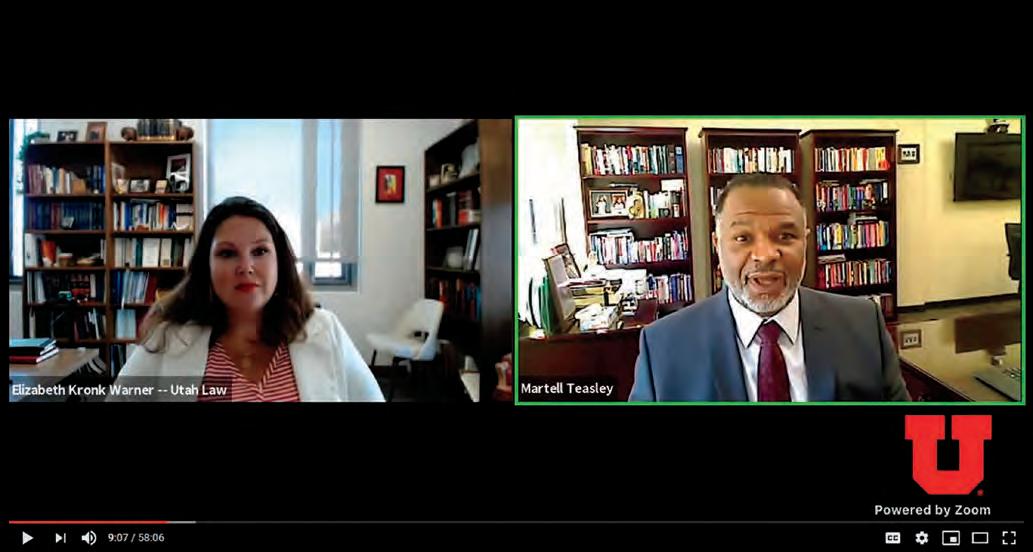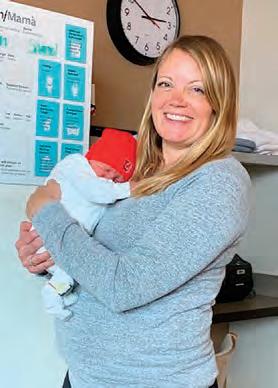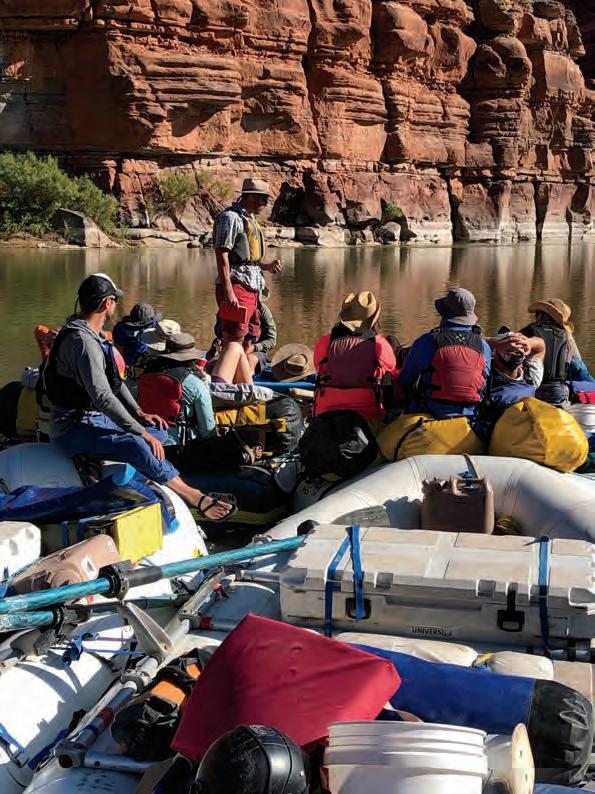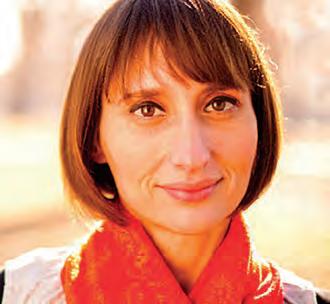
19 minute read
Social Work News
Responding to Racism
Dean Elizabeth Kronk Warner and Dean Martell Teasley during their September discussion, “Continuing the Conversation on Race and Racism.”
“Racial inequality is at the core of so many of the problems we face as a society, and requires not only vigilance, but actions.” In June, in the emotional wake of the deaths of George Floyd, Ahmaud Arbery, and Breonna Taylor, Dean Martell Teasley released a statement regarding racism to the College of Social Work community. “Racial inequality is at the core of so many of the problems we face as a society, and requires not only vigilance, but actions to change policies that separate groups within our society, marginalizing some, and lead to deep mistrust, fear, and hatred,” he wrote. View the full statement online for details on how the College is working toward anti-racism.
Events:
Dean Teasley and Dean Elizabeth Kronk Warner of the S.J. Quinney College of Law participated in a pair of U of U Alumni Association conversations on race and racism, in which the deans shared their experiences and insight while discussing books on racism in the United States.
The Utah Criminal Justice Center produced the “UCJC Dare to Care” series, consisting of three events focusing on the intersection of race and law enforcement that each challenged guests to reject apathy and silence.
Task Forces:
CSW faculty members are responding to racism both at the University and on the national stage. Dave Derezotes will serve as the chair of the University’s Faculty Senate Advisory Committee on Diversity, while Tiffany Baffour will serve on the Council on Social Work Education’s Taskforce to Advance Anti-Racism.
The New Grand Challenge:
The Grand Challenges for Social Work announced the addition of a new challenge: the Grand Challenge to Eliminate Racism. Dean Teasley, who advocated for the addition of this challenge, will spearhead the effort alongside Michael S. Spencer of the University of Washington.
Reading:
The College’s Diversity and Social Justice Committee compiled a list of books, podcasts, films, and organizations supporting the journey toward anti-racism, including steps to take immediate action.
Additionally, this year Dean Teasley selected the book “Mindful of Race: Transforming Racism from the Inside Out” for the annual faculty and staff book discussion.
A College in the Time of COVID
As the novel coronavirus began to spread to Utah, the College of Social Work quickly worked through challenges that the virus presented.
Beginning on March 16th, the College moved entirely online, with faculty and staff working remotely to deliver lessons to students virtually. Faculty members quickly mastered online teaching and left students pleased with the quality of their education.
While the transition to online education was carried out smoothly, the changes in the practicum experience presented a greater challenge for students, faculty, and staff. Practicum agencies reacted quickly to the virus, resulting in some students moving to telehealth platforms, and some leaving agencies entirely. The practicum team worked tirelessly to ensure that all students were able to complete their practicum and graduate on time—a daunting task considering the number of students that were displaced due to COVID-19.
After successfully altering a Grand Challenges event in March to an online event, the College was inspired to offer online events over the summer, beginning with a virtual graduation ceremony. Dean Teasley hosted five “QuaranTalks with Teasley” webinars throughout the summer, during which faculty members presented their research. The first few webinars were particularly useful for first responders, health care professionals, and social workers navigating their way through caring
Pandemic Priorities: Students’ Stories
This spring, associate professors and program directors Tiffany Baffour and Jason Castillo were concerned about how to support their students in the middle of a uniquely difficult time. Though they found literature that discussed how universities and students responded to natural crises—earthquakes, hurricanes, floods—there was no data about pandemics similar to COVID-19. Wanting to gain particular understanding, they crafted a set of survey questions designed to understand social work students’ perceptions of how various entities responded to COVID-19, as well as the impact COVID-19 has had on their physical and psychological health, well-being, and academic performance. Additionally, they held focus groups to deepen their understanding of how the students were accessing campus services.

for clients, and themselves, during a pandemic. The College’s Community Advisory Board also developed a series entitled “Talking Telehealth” focusing on the increasingly essential world of telehealth (see page 15). Continuing education units were offered for each of the webinars, with the usual fee waived by Dean Teasley. Faculty and staff members have adjusted to the many unusual circumstances that are associated with working from home during a quarantine—including a few new furry co-workers for some members of the College. A “Coping with Quarantine” blog post featured the many things that faculty and staff have been doing during quarantine. Activities outside of work included at home haircuts, birdwatching, knitting, and finding

Assistant Professor Alysse Loomis (left) with her new baby, and Assistant Dean for Development Lisa Himonas (right) working with her fluffy officemate.
new ways to entertain children from dawn until dusk.

The results of the survey and focus groups are still being analyzed, but even in the initial analysis, Drs. Baffour and Castillo are excited about what they’re learning. “It’s findings from studies like this that help us move the conversation forward so we can do better the next time around.”
MSW Director Tiffany Baffour and PhD student Kwynn Gonzalez-Pons’ MSW class, Social Policies.
Pooping in a Bucket… for Science!

Operating under the “leave no trace” ideology, the team packed-in and packed-out all of their food, water, equipment, and personal waste. Last October, over fall break, a group of 21 professors and environmental scientists loaded into heavy-duty river rafts and headed down Utah’s Cataract Canyon for an interdisciplinary learning and teaching experience like no other. Scholars and researchers from the University of Utah, the United States Geological Survey, and the Returning Rivers project all donned life jackets and slathered on sunscreen for the adventure. The grand purpose: to discuss research, educational, and collaborative opportunities, as well as explore the future use of the river as an experiential classroom for university students.
Over the course of the week-long trip down a spectacular, 85-mile stretch of the Colorado River, navigating the river’s rapids was sandwiched between morning and evening lectures offered through the lens of a wide variety of disciplines. Each of the participating scholars presented their peers with a lesson on their particular area of expertise and its intersections with climate change. Environmental science, geology, art, philosophy, sociology, biology, and social work were all represented.
Operating under the “leave no trace” ideology, the team packed-in and packed-out all of their food, water, equipment, and personal waste. Yes, these accomplished scholars and scientists spent a week pooping into a bucket. “The ‘groover’ is much nicer than a bucket,” assures Richie Landward, an assistant professor/lecturer in the U’s College of Social Work and one of the self-funded trip’s organizers.
Prof. Landward has more than two decades of experience guiding trips down Cataract Canyon. It is a special place to him, and one he is eager to share with future scholars, scientists, and outdoor enthusiasts. In addition to teaching his colleagues about the impact of climate change on our collective and individual social and emotional wellbeing, he taught them about all aspects of how a river works and gathered pre- and post-trip data on the participants’ relationships with their surroundings. “I hope that by helping people better understand their environment, and the science behind it, we can cultivate an emotional connection and motivation to take action around climate change,” said Prof. Landward.
It seems the groover was not a deterrent, since the group planned to further explore teaching, learning, and research opportunities in the area this fall. Although COVID-19 put that plan into dock, Prof. Landward and his collaborators are looking forward to their next opportunity to build understanding and support for this unique classroom.
A Series of Solutions to the Grand Challenges
In October of 2019, Dean Teasley premiered the Grand Challenges for Social Work event series with an overview of the challenges deemed the toughest but most critical social issues that can be rectified with evidencebacked solutions. These challenges are divided into three categories: individual and family wellbeing, stronger social fabric, and just society. Each event in the series focused on a topic that works toward addressing at least one of the challenges.
The first event, “Ending Conversion Therapy: Effecting Change through Policies and Practice,” which highlighted the challenge of ensuring healthy development for all youth, was held in November. Matthew Shurka and Shannon Minter spoke about their conversion therapy experiences and how legislative bodies across the U.S. are working to end the practice. Local advocates Lisa Hansen and Clifford Roskey then joined for a conversation moderated by Tammer Attallah regarding the state of conversion therapy in Utah. Two months later, legislators banned licensed therapists from conducting conversion therapy on minors in the state of Utah.
The second event, held in February, emphasized the challenge of achieving equal opportunity and justice. “Race, Higher Education, and the Grand Challenges for Social Work” concentrated on historically Black colleges and universities’ role in the conversation about a new grand challenge regarding racism. At the time, many felt racism was inherently included within the challenges. Dean Sandra Edmonds Crewe discussed racism in education and supported the idea of a new challenge to end racism—an addition that Dean Teasley also advocated for. In the following months, the killings of Black individuals opened the eyes of many to the systemic racism in the country, just as a new challenge was approved and announced: the Grand Challenge to Eliminate Racism.
The final event, “Dying in Vein: The State of the Opioid Epidemic—Clinical and Policy Updates,” which was held virtually in March, related to the challenges of closing the health gap and advancing long and productive lives. Guests viewed PhD alumna Jenny McKenzie’s film about substance use disorder and the broken treatment system, then tuned in for a webinar featuring Dr. McKenzie, Associate Dean Eric Garland, and individuals from the film.
This series stressed the need to prioritize and tackle these challenges—two of which have since seen major strides in the right direction. The College will continue to highlight the importance of the Grand Challenges through upcoming events, and hopes to see similar advancement in relation to the topics covered.
The second year of the Grand Challenges for Social Work event series kicked off in September with an event on the Grand Challenge to End Homelessness.

A panel of local and national experts discussed research, policies, and legislation around conversion therapy.
Disproportionate Minority Contact Solutions
Although the topic has gained more salience in recent days, Derek Mueller, a senior research analyst in the Utah Criminal Justice Center (UCJC), has spent years studying differences in rates of contact with the police between non-white and white youths—also known as disproportionate minority contact, or DMC;. Mr. Mueller said that although there isn’t currently a wide body of research to show how effective different interventions are in achieving change, there are general guidelines for ways to approach DMC successfully. He had the following suggestions:
Use a top-down approach. “Once the administration of a department buys into the realization that DMC exists and wants to try to address that, it gets a better sense of buy-in from the officers.”
Basic Needs for Student Success
Leaving home at age 13, Sarah Elizabeth Garza-Levitt became a single mother at age 15. After earning her GED at age 16, it took her 23 years to earn her associate’s degree from Salt Lake Community College. “During that time, I dropped out, Generate awareness, particularly through the role of the state DMC coordinator. “It’s important to have someone that can use state level and agency-specific data to help inform officers on this issue and talk through it more, breaking down the barriers of resistance to the idea that DMC exists or the narrative that DMC is an attack on them specifically. This is a larger problem than related to individual officers.”
Use a community policing strategy.
“When you have officers in the community serving as mentors for youth, helping with sports and after school programs, the community is able to see that their jobs are more than large scale raids. You’re showing that this is not just a brute force cop coming in to your community in search of making an arrest.” I failed out, I left due to medical issues, I left because of a variety of things … some were basic needs,” she said. “I didn’t know the resources that were available to me.” Graduating from the U with her BSW in 2019, today Ms. Garza-Levitt is earning her MSW as an advanced standing student. Her story explains why she is such a passionate advocate for struggling students, and why her face lights up when she talks about her latest project: the Basic Needs Center (BNC).
The BNC is a product of the Basic Needs Collaborative, which Ms. GarzaLevitt helps lead. The interdisciplinary group recognizes a student’s capacity to meet their basic needs—economic, food, and housing—has a direct impact on their health, well-being, and ability to succeed. With the goal of bridging services and supporting comprehensive and coordinated basic needs on campus,
U Police Capt. Shawn Bryce talking with students during Move-in week 2020. Capt. Bryce is in charge of the police department’s community outreach program.

Hire officers that represent the communities they are serving. “Officers that represent the community have the most cultural insight into the community’s differences. How things operate across different cultures is important and someone from one culture won’t have

that lived insight into another culture.” the Collaborative is piloting BNC services and planning the build-out of a BNC in the Student Union in the spring of 2021. Ms. Garza-Levitt worked with the U’s Women’s Resource Center leadership to involve social work practicum students who will complete assessments at the BNC, then provide a warm handoff to the partnering centers and resources a student might need to access.
While such multifaceted centers exist at other universities, this is the first such center in Utah … but not for long. Ms. Garza-Levitt is communicating with other Utah colleges and universities as they work to build similar programs. “It’s a pervasive issue among students that impacts retention and completion, safety, equity, diversity, and inclusion within institutions across the state,” she said. “I know what it is to struggle. Helping others is very personal for me.”
Kudos!
Tiffany Baffour Sarah Canham
The Council on Social Work Education (CSWE) appointed Associate Professor and MSW Program Director Tiffany Baffour to a major taskforce. Dr. Baffour will serve on the Taskforce to Advance Anti-Racism to integrate anti-racism pedagogy and methods into social work education. Dr. Baffour has also been re-appointed for another three-year term as the Chair of the Council on Conferences and Professional Development at CSWE.
The Gerontological Society of America (GSA) selected and officially inducted Associate Professor Sarah Canham as a fellow. Dr. Canham will be recognized for this significant achievement alongside other new GSA fellows at the GSA Annual Scientific Meeting in November.
The University’s Faculty Senate Advisory Committee on Diversity selected Professor David Derezotes to serve his first term as the chair of the committee. Dr. Derezotes will work with the committee to further develop plans for diversity and inclusion within the University.
Assistant Professor Jeremiah Jaggers was selected to join the 2019-2020 University Foundation Fellows Program. During this sevenmonth program, Dr. Jaggers received structured support for his research and scholarly activities while further enhancing his capacity to receive funding for his work in the future.
David Derezotes Jeremiah Jaggers
Assistant Professor Alysse Loomis was selected to join the Infant and Early Childhood Mental Health Taskforce within the Council on Social Work Education. As part of the taskforce, Dr. Loomis will work with other scholars in the field to develop a competency guide for mental health in young populations.
The National Association of Deans and Directors of Schools of Social Work re-elected Dean Martell Teasley as president. Dr. Teasley will continue to represent the College and the social work profession on a national stage as he completes his second three-year term.
Research Assistant Professor Chad McDonald was appointed to the Executive Advisory Council of National Staff Development Training Associations, one of nine affinity groups of the American Public Human Services Association. As a member of the council, Prof. McDonald will share ideas about organization development, staff development, and training.
PhD candidate Hanna Morzenti, who successfully defended her dissertation proposal in April, was selected for a University Graduate Fellowship for the 2020-2021 academic year. The fellowship will support Ms. Morzenti as she works to develop diagnostic and treatment recommendations for high functioning individuals with autism within the criminal justice system.
New Director to Shine the Light on Gender and Race in Criminal Justice

When Emily Salisbury, the new director of the Utah Criminal Justice Center (UCJC), arrived in Salt Lake City, she hit the ground running— getting to know her new team via Zoom, coordinating a complex licensing agreement, and launching the UCJC Dare to Care discussion series. Yet, she also made time to introduce herself to our College of Social Work community.
Social Work Matters: Tell us a bit about you.
Emily Salisbury: I grew up in Tulsa, Oklahoma, but I don’t have an accent because my parents were transplanted New Yorkers. I was an all-state tennis champ in high school and earned my bachelor’s on a tennis scholarship at William Jewell College in Missouri. I moved on to Castleton State College [now Castleton University] in Vermont, where I earned my master’s. They had one of the only research programs in forensic psychology; most forensic psych master’s programs are clinical. I got to serve as the managing editor for the journal housed there, Criminal Justice and Behavior, which is one of the top-tier journals in criminology and penology. The experience was instrumental in improving my writing and analytical skills, and really got me involved in the peer-review process. I later served a five-year term as editor-in-chief of that journal. I felt very fortunate to earn my PhD from the University of Cincinnati in criminology and criminal justice. I had great mentorship and it was there that I helped co-develop and create the Women’s Risk Needs Assessment (WRNA) tool.
My first academic position was at Portland State University, where I earned tenure, then spent the next six years at the University of Nevada, Las Vegas. Now I’m happy to be at the U!
SWM: What drew you to the U and the Utah Criminal Justice Center?
ES: I focus on the intersection of mental health, psychology, and criminal justice, which is why it’s such a natural fit for me to be here. Social workers look at the whole person in the environment, which is how I sort of see my work. In criminology, we’re still debating whether trauma is a meaningful construct for how people behave in the system, especially in the risk assessment world. But I don’t have to have that debate with social workers— they understand the complexities of how trauma matters in people’s lives.
UCJC is also so well positioned in this state and in this region to do incredibly important work. It already has a board with all the key stakeholders in the state, so relationships are already embedded in the governance of UCJC. I will have accomplished my
goals if I can help both the University and the region understand what incredible work UCJC really does, and have an influence on public policy and practice in the state and in the region. I want it to be a center of excellence around recognizing and understanding how both gender and race matter in criminal justice and law. In the work that we do, lives really are at stake.
SWM: Although most of our faculty and staff will continue to work remotely through the fall, tell us about some special item that will be in your office at the College of Social Work.
ES: I have a basket that was woven by incarcerated women in Namibia, which represents so much to me. It was given to me as a gift when I was doing a WRNA training there. It’s in a display case in my last department in Las Vegas, so they have to send it to me.
SWM: Speaking of Las Vegas, what’s the best show you got to see?
ES: Elton John had a residency at Caesars Palace with his Million Dollar Piano show, and one year he hosted a big weekend event to raise money for the Elton John AIDS Foundation. He brought in a bunch of former top tennis players to play
The Women’s Risk Needs Assessment (WRNA) tool is the only peer-reviewed, validated, risk/needs assessment specifically designed for justice-involved women. Developed with federal funds through the National Institute of Corrections, in partnership with the University of Cincinnati, WRNA examines psychosocial risks, needs, and strengths in gender- and trauma-responsive ways. “It was really designed, from the bottom up, for system-involved women,” explains Dr. Salisbury, who co-developed the tool. “Women clients often say, ‘Thank you for asking questions that really matter to me.’” The tool involves three elements: a case file review, a semistructured interview (with both gender-neutral and women-specific questions), and a self-report survey. This well-used tool has been implemented in more than 50 agencies across the U.S., as well as around the globe, including in the Czech Republic, Namibia, Singapore, and the United Kingdom. Thanks to Dr. Salisbury, the U now has a non-exclusive license agreement with the University of Cincinnati to sublicense WRNA to agencies, and UCJC has developed a fully online interactive training.
an exhibition match. Being a tennis player, I donated and got tickets to the exhibition match, the silent auction with the tennis players, and the Million Dollar Piano show. Before the show, I spotted Billie Jean King! She was a formative person in promoting gender equity in sports. I ran up to her and quickly said, “Billie Jean, I just have to say thank you for all the work you’ve done for women,” and then ran away.
I got to sit in the third row! I was dressed to the hilt, and was one of the few people standing up in the auditorium and dancing, having a great time. Then Elton John starts to play the song “Philadelphia Freedom.” He wrote that for Billie Jean; they’re besties. I turn around, and she’s 15 rows behind me, and I look at her. Because I had run up to her before the show, she recognized me. I pointed to her, like, “Oh my gosh!” and she pointed back, and she and I had this moment, in front of thousands of people, as Elton John starts playing her song!
After the show, I had to run up to her again and ask for a selfie with her.

Emily Salisbury (left) in Las Vegas with tennis legend Billie Jean King (right).




